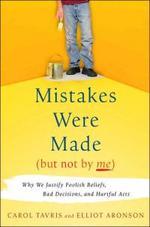Do you Mismanage Cognitive Dissonance?
Monday, June 27th, 2011The mismanagement of cognitive dissonance is a root cause of many of our toughest problems in the workplace. It has to do with what we think and do when confronted with two or more conflicting beliefs. For example, we all make mistakes and therefore have to confront the conflict – I am a good person but I did a bad thing. And we get plenty of mixed signals – I should take more creative risks but I don’t think I will succeed.
Cognitive dissonance is especially powerful (makes us feel very uncomfortable) when the conflicting beliefs are about ourselves. To relieve the discomfort we may self justify or rationalize, for example making excuses for our bad behavior rather than owning up. This is a slippery slope and can lead to good people falling into unethical or unwanted behavior patterns.
As cognitive designer we need to be able to spot when cognitive dissonance sits at the root of organizational problems and then find productive ways to vent the discomfort associated with it.
The confessional is an excellent example of how religion has institutionalized one way of managing cognitive dissonance that appears to block the cycle of self justification.
The general idea is to promote takening healthy ownership of mistakes, giving people a constructive way to discharge the discomfort associated with cognitive dissonance and advocating apologizing as a virtue not a weakness. Figuring out how to do this is essential for a wide-range of workplace programs as diverse as ethics and innovation.
For background and practical insights into the nature of cognitive dissonance and self justification check out, Mistakes Were Made (but not by me). Suggest you start here for a good 10 minute overview but if you are serious about cognitive design study the book.
Interested to hear from readers that have factored cognitive dissonance into the design of workplace improvements and employee development.
